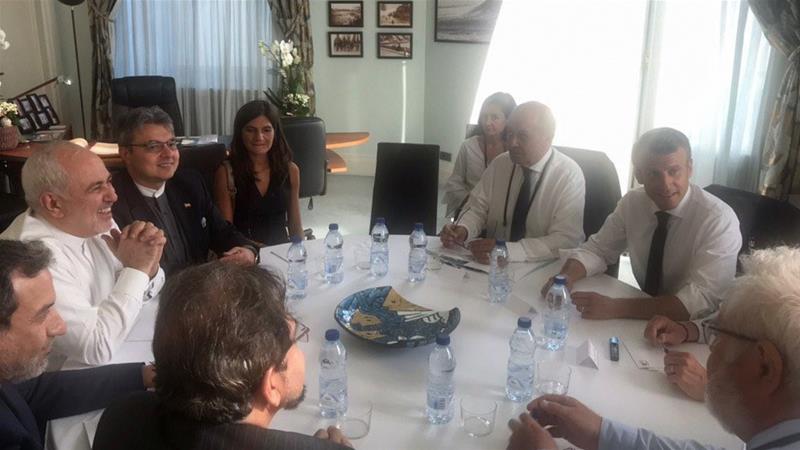Iran’s mixed messages on negotiations with US

In recent weeks, the French government, represented by President Emmanuel Macron and Foreign Minister Jean-Yves Le Drian, has made a diplomatic bid to mediate between the US and Iran. This comes on the back of lengthy phone conversations between the Iranian and French presidents. As a result of these positive conversations, Iranian President Hassan Rouhani commissioned his foreign minister to fly to Paris after completing his Scandinavian tour.
After only a few days, global media agencies reported on the arrival of Mohammed Javad Zarif in the French city of Biarritz to again meet with Macron and Le Drian, this time on the sidelines of the G7 summit, which was attended by US President Donald Trump.
It seems that the French move has achieved its desired objective, despite the US assertion that it had not been briefed on the invitation sent to Zarif. The reaction of Trump was indicative of this when he said, with uncharacteristic terseness, “no comment.” During the press conference between Macron and Trump, however, the US leader insisted that he would not mind meeting with the Iranian president, while maintaining that Iran remains the primary global sponsor of terrorism and that it needs to change its regional behavior.
From the Iranian side, meanwhile, Zarif’s trip to Biarritz provoked a massive amount of controversy in the domestic political sphere, triggering conflicts among the various political movements in the country. The group closest to the Rouhani administration declared its support for the move and lauded Zarif’s presence at the summit as a positive, despite being sanctioned by the US. It asserted that Zarif’s attendance provided further proof that it is actually the US president who is suffering diplomatic isolation, as it had previously claimed. Rouhani also announced that he too would not mind meeting with any foreign official, so long as this meeting would bring benefits to Iran and serve its national interests.
For its part, the conservative movement, which is closer to Supreme Leader Ali Khamenei, strongly condemned Zarif’s visit to Biarritz and lambasted the comments by Rouhani, suggesting that these were indicative of his desire to continue his earlier policies of appeasement and to seek overtures with the West, leading to Iran’s submission to the US and other Western governments. These hard-liners also reiterated that the US cannot be trusted, insisting that there could be no consideration of holding any negotiations with Trump’s administration until US sanctions were lifted, particularly those imposed on Iran’s oil exports.
Zarif’s trip to Biarritz provoked a massive amount of controversy in the domestic political sphere.
Dr. Mohammed Al-Sulami
Feelings ran high on this issue, with 83 Iranian lawmakers warning Rouhani against any negotiations with Trump. This warning, submitted by Javad Abtahi, Ahmed Azadikhah and Ahmad Amirabadi Farahani, all of whom are conservatives, demanded that Rouhani answer questions about his position on a number of issues. In the warning, they said: “What is the reason behind your adoption of positions different from those of the supreme leader? Why would you meet and negotiate with someone (Trump) who you yourself described as mad?”
Meanwhile, Khamenei reportedly ordered that there would be no form of negotiations with the US administration and called potential talks with Washington a “fatal poison,” according to reports published by Iranian state-run news agencies.
The latest moves by the Iranian government and the controversy surrounding them at home are reminiscent of what happened before the signing of the 2015 nuclear deal and the toing and froing between Rouhani, Zarif and the P5+1 members. Also, the exchange of messages between Trump and Rouhani and the possibility of a meeting between the two on the sidelines of the UN General Assembly meeting in New York in the coming weeks is reminiscent of the phone call between Rouhani and his then-US counterpart Barack Obama in September 2013.
Perhaps there are some differences between the two phases. The team surrounding Obama was strongly supportive of his phone calls and shared his rapport with Rouhani and Zarif. In Trump’s case, however, his advisers and the White House team, especially Secretary of State Mike Pompeo and National Security Adviser John Bolton, strongly oppose any rapprochement with the Iranian regime. It is well known that the personalities of Obama and Trump are quite different, as are their approaches to US foreign policy in general, with Obama managing Middle Eastern issues in particular differently from Trump.
On the Iranian side, the criticisms leveled at the negotiations related to the Iranian nuclear program, even in the phase preceding the signing of the deal in 2015, were not much different from the slogans currently being used by the same conservatives to again condemn Rouhani. However, the supreme leader has found a possible way out of the current impasse by launching a new slogan, “heroic flexibility,” under the pretext that any negotiations that take place with the “Great Satan” within the framework of aiding Iran’s nuclear program could be allowed if they meet certain objectives, such as endorsing the 2015 nuclear deal and the US rejoining it.
Given the economic deterioration currently afflicting Iranian society due to US economic sanctions, which are far harsher than those previously experienced by Iran in 2013, it is not surprising for Khamenei to conjure up a new slogan and initiative expressing his approval of further negotiations with the US, or blessing a possible meeting between Rouhani and Trump.
Regardless of whether or not a meeting takes place between Trump and Rouhani, and whether this ushers in a new phase of negotiations between the US and Iran, Arab countries should learn the lessons of the recent past and seek to play an effective role in any future negotiations to maintain their own interests, given the fact they are the ones most directly affected by the Iranian regime’s behavior in the region. They should, therefore, ensure that sufficient pressure is put on Iran to guarantee that the terms of any expected future agreement will include cast-iron pledges on Tehran’s missile program, as well as guarantees to curtail Iran’s hostile behavior and its threats to global navigation.
- Dr. Mohammed Al-Sulami is Head of the International Institute for Iranian Studies (Rasanah). Twitter: @mohalsulami










































